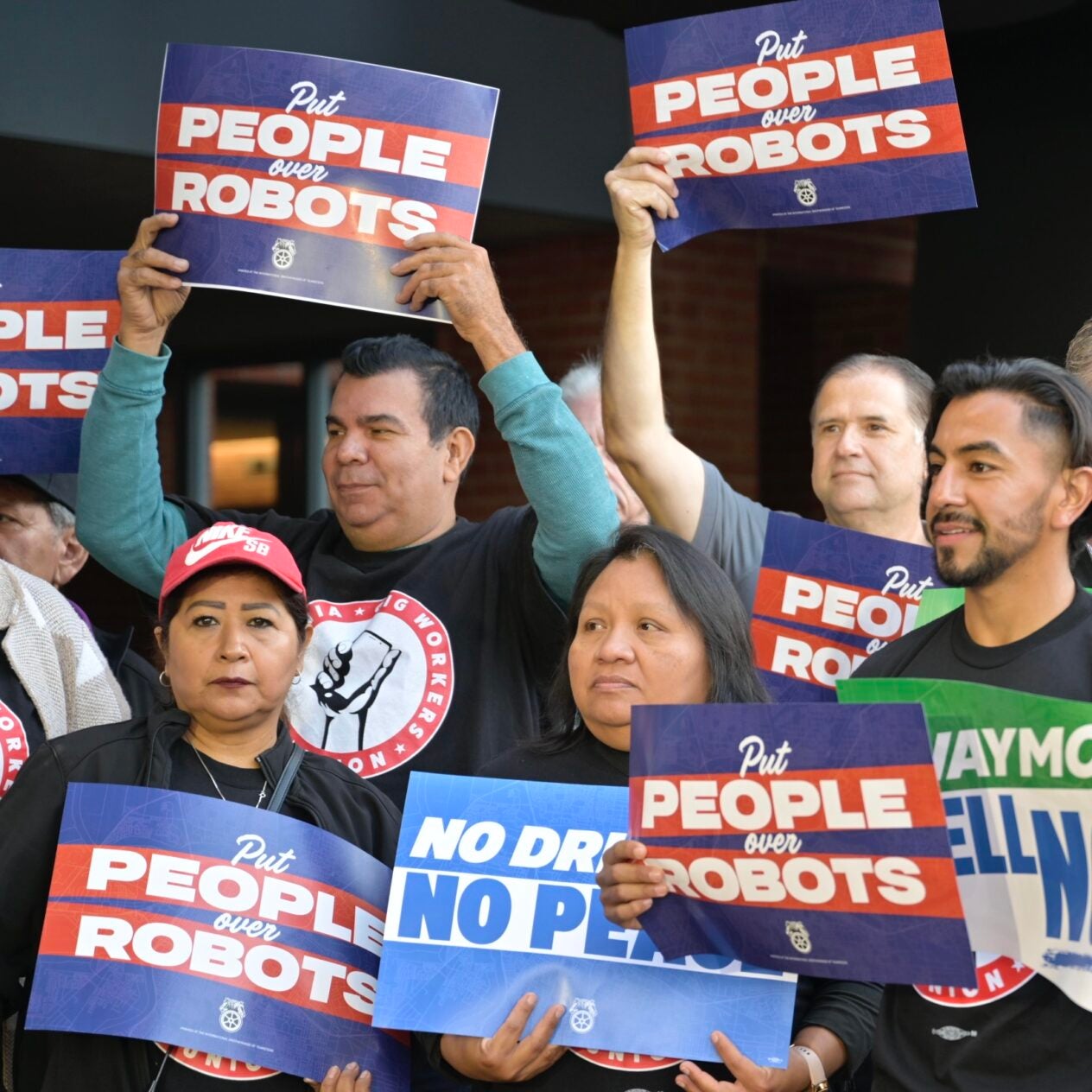Press Releases
Teamsters Applaud Introduction of CARS Package on Autonomous Vehicles

Bills on Human Operator Requirements, AV Controls Critical to Safety and Good Jobs
Press Contact: Matt McQuaid Phone: (202) 624-6877 Email: mmcquaid@teamster.org
(SACRAMENTO, Calif.) – The Teamsters applauded the introduction of two bills in California that are part of the California Automotive Regulatory Standards (CARS) Package, a series of legislative measures that state lawmakers are prioritizing to regulate autonomous vehicles (AVs).
An assembly bill to be introduced at a later date will require a trained human operator behind the wheel of any AV weighing 10,000 or more lbs., and Senate Bill 915 (SB 915) would require AV companies obtain an approval through a local ordinance prior to starting operations in a given municipality. The assembly bill is substantively identical to AB 316, which was introduced by Assemblymember Cecilia Aguiar-Curry (D-Winters) last session, and the local control bill was introduced by Senator Dave Cortese (D-San Jose).
Both bills already have broad support. AB 316 received yes votes from more than 90 percent of the legislature last session, and SB 915 is co-sponsored by the League of California Cities.
To date, AV regulation in California has been left exclusively to regulatory agencies, including the Department of Motor Vehicles (DMV) and the California Public Utilities Commission (CPUC), while municipalities continue to lack any control over AVs wreaking havoc on local streets. As a result, California remains without proper enforcement of AV safety measures or accountability.
“California cannot afford to outsource the regulation of dangerous technology to Big Tech,” said Peter Finn, Teamsters Western Region International Vice President and Secretary-Treasurer of Teamsters Local 856. “California must implement real AV safety standards and ensure local municipalities have a say in AV deployment, especially given the botched regulatory oversight by the DMV and CPUC. We applaud Assemblymember Aguiar-Curry and Senator Cortese for introducing legislation that is essential to keeping our roads safe.”
“California’s deployment of AVs in 2023 is the perfect case study for what not to do. From Gov. Newsom’s veto of AB 316 — a bill that received resounding support from lawmakers on both sides of the aisle — to the CPUC and DMV, too many people in state government last year chose not to put safety first, and it showed,” said Jason Rabinowitz, President of Teamsters Joint Council 7. “Thanks to Assemblymember Aguiar-Curry and Senator Cortese, California has another shot to make things right and pass common sense safety measures to save lives and protect jobs.”
The DMV has failed to track at-fault data for collisions involving AVs for several years and driverless vehicles remain immune from receiving traffic tickets. Meanwhile, the CPUC, whose lead Commissioner John Reynolds formerly worked as legal counsel to AV company Cruise, ruled in favor of unlimited expansion of Cruise and Waymo robotaxis on San Francisco roads in August, despite widespread pushback from elected officials and public safety representatives. Cruise later suspended operations nationwide after an incident that left a pedestrian grievously injured. Cruise vehicles also collided with fire trucks, were accused of being responsible for the death of a patient after blocking an ambulance, impeded workers by getting stuck in concrete, blocked waste trucks, caused a massive traffic jam outside of a music festival, and triggered a 20-car pile up in a tunnel. Last year a Waymo robotaxi killed a dog as well.
In spite of the abysmal track record that robotaxis have in California, the DMV recently approved Waymo’s permit to expand into additional municipalities in the San Francisco and Los Angeles metro areas. The DMV approval also includes 2/47 access to freeways, highways, parking lots, and all other roads at speeds of up to 65 mph, even in inclement weather.
“Gov. Newsom can continue to cower to Big Tech and put millions of good jobs in jeopardy, or he can grow a backbone and stand up for working people. Either way, the Teamsters are not backing down from this fight,” said Lindsay Dougherty, Teamsters Western Region International Vice President and Secretary-Treasurer of Teamsters Local 399. “The Teamsters encourage all state lawmakers to join Cortese and Aguiar-Curry in prioritizing the well-being of Californians and the preservation of good-paying union jobs.”
In addition to safety risks, AV technology also threatens the livelihoods of hundreds of thousands of hardworking Californians. In California, there are roughly 200,000 professional drivers. Accounting for the ripple effect of automating commercial driving nationally, AVs could eliminate more than 15 million jobs across the U.S. Many of these would be in rural communities.
“The reason that companies like Google and General Motors pour so much money into AVs is because they know they can increase profits by killing jobs through automation,” said Chris Griswold, President of Teamsters Joint Council 42. “Corporate America does not work in the best interest of Californians. This is why legislation that protects working people is so urgent. Many California lawmakers have already shown their support for AV regulation, but the Teamsters strongly urge all elected officials to stand up and stand with us to safeguard workers and our communities.”
Founded in 1903, the International Brotherhood of Teamsters represents 1.3 million hardworking people in the U.S., Canada, and Puerto Rico. Visit Teamster.org to learn more. Follow us on Twitter @Teamsters and “like” us on Facebook at Facebook.com/teamsters.